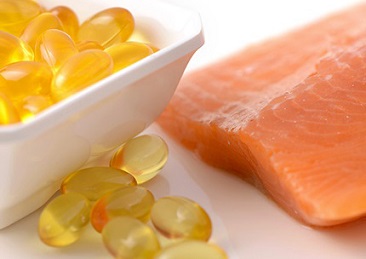New Zealand Led Study Finds That Omega-3 Fatty Acids Are Useful In Treating COVID-19 Associated Cardiovascular Issues
COVID-19 Supplements - Omega-3 Fatty Acids May 06, 2023 1 year, 11 months, 1 week, 5 days, 13 hours, 49 minutes ago
COVID-19 Supplements: As the world grapples with the ongoing COVID-19 crisis, researchers are looking at various ways to support the immune system and reduce the risk of severe illness. One promising area of research involves the potential benefits of omega-3 polyunsaturated fatty acids (N3PUFAs) on cardiovascular health in the context of COVID-19.

A new study review led by researchers from University of Auckland-New Zealand has found that that Omega-3 fatty acids are useful in treating COVID-19 associated cardiovascular issues. The study also involved scientists from the Shenzhen University-China.
SARS-CoV-2 infections can cause a hyperinflammatory response that leads to the formation of blood clots, which can affect blood vessels throughout the body, including those that supply the heart. There is growing evidence that COVID-19-related immunothrombosis can increase the risk of cardiovascular diseases or CVD.
Furthermore, patients with pre-existing CVD are at a higher risk of experiencing complications from COVID-19. It is vital for healthcare providers to monitor COVID19 patients for signs of CVD and provide appropriate treatment to reduce the risk of complications.
At this time, there are no clear studies that demonstrate the positive effects of N3PUFA on COVID-19 patients. However, high dose concentrated N3PUFAs (4 g/day) have been shown to regulate and modulate certain negative immunological overreaction effects, limit coagulopathy, and influence cell signaling and gene expression. They are well known to have antithrombotic, anti-inflammatory, and pro-resolving properties, which can be advantageous for COVID-19 patients. The ingestion of N3PUFAs and/or their metabolites may prevent and manage cardiovascular and thrombotic issues in COVID-19 patients.
It is, therefore, important to study the possible uses of fish oil/N3PUFA supplementation as an adjuvant to existing COVID-19 treatment protocols especially for COVID-19 patients at risk of vascular thrombotic events.
N3PUFAs, such as eicosapentaenoic acid (EPA) and docosahexaenoic acid (DHA), have been shown to improve endothelial function, decrease coagulopathy, and attenuate uncontrolled inflammatory responses and oxidative stress. Their excellent safety profile makes them a prospective adjuvant treatment for those exposed to a higher risk of cardiovascular problems associated with COVID-19 and are these days being regarded as one of the important
COVID-19 Supplements.
The endothelium, a single-cell layer lining the innermost blood vessels, plays a critical role in regulating vascular toning and modulating the immune system. Research has revealed an association between endothelial dysfunction and the SARS-CoV-2 infection, as well as in long COVID-19. COVID-19 patients with existing cardiovascular diseases (CVDs) or those developing CVDs without pre-existing comorbidities are at increased risk of severe illness due to high levels of proinflammatory cytokines, severe local vascular dysfunction, and intense oxidative stress.
Amid these health challenges, enhancing patients’ general immunity through dietary intervention and nutraceutical supplementation has emerged as a potential solution. N3PUFAs,
found in marine sources and recognized as safe, could offer a safe and convenient prophylactic and conjunctive supplementation or treatment approach for patients with comorbid CVD.
N3PUFAs have been shown to improve endothelial function through various mechanisms, such as increasing nitric oxide availability, mitigating the vasoconstrictive effect of endothelin-1, and stimulating endothelial progenitor cells. They also possess antithrombotic properties, reducing platelet aggregation and adhesion, thereby preventing blood clot formation. Moreover, N3PUFAs have been demonstrated to reduce proinflammatory molecules and increase anti-inflammatory molecules, contributing to better cardiovascular health.
In addition to their cardiovascular benefits, N3PUFAs have been found to reduce inflammation during viral infections. They incorporate themselves into the phospholipid bilayers of cell membranes of neutrophils, an essential part of the innate immune system, and produce a range of lipid mediators targeting sites of tissue damage and infections. N3PUFA also improves macrophage function, promoting phagocytosis and blunting M1 macrophage polarization while promoting M2 polarization.
By downregulating nuclear factor-κ beta (NFκB), inducing interferons (IFNs), and affecting the motility of CD4+ and CD8+ T cells, N3PUFAs help modulate cytokine responses to viral attack. They also serve as metabolic substrates of lipoxygenase and cyclooxygenase, producing “specific pro-resolving mediators” (SPMs) that end acute inflammatory responses.
Given the potential benefits of N3PUFAs in cardiovascular health and inflammation management, they could play a crucial role in supporting immune health and mitigating the severity of COVID-19 infections. However, further research is needed to fully understand the mechanisms by which N3PUFAs exert their effects and to determine the optimal dose and duration of supplementation for preventing thrombosis and supporting cardiovascular health in the context of COVID-19.
The study review was published in the peer reviewed journal: Metabolites.
https://www.mdpi.com/2218-1989/13/5/630
For the latest on
COVID-19 Supplements, keep on logging to Thailand Medical News.
